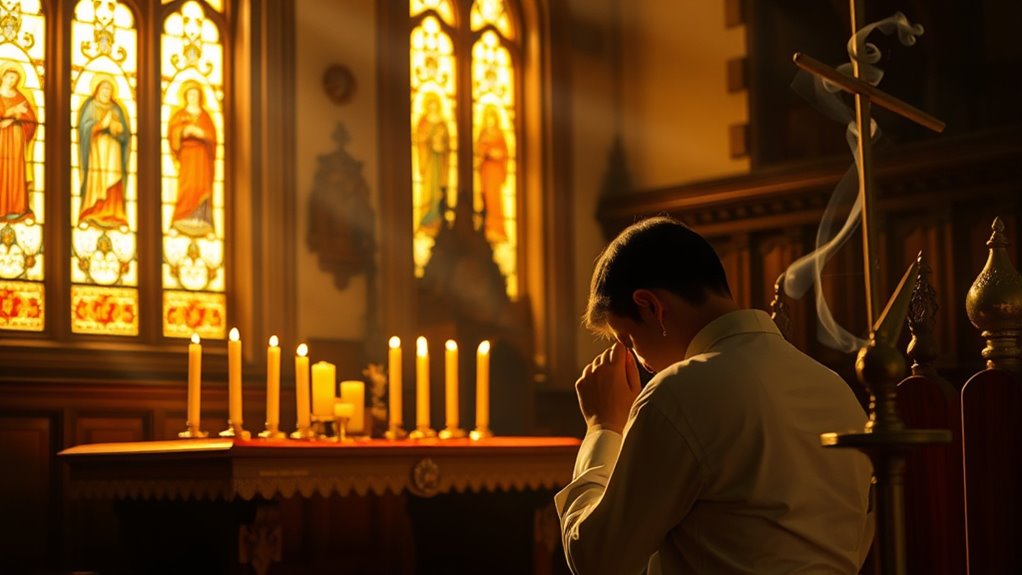Many Christians believe praying for the dead is meaningful because biblical themes, tradition, and divine mercy support it. You can pray to help souls in purgatory or to seek God’s mercy for loved ones past, trusting that prayer can aid their spiritual journey. While perspectives vary among churches, understanding the traditions and theological reasons behind this practice can deepen your faith. If you’re curious, you’ll find more insights on how this practice connects to Christianity’s core beliefs.
Key Takeaways
- Many Christian traditions, especially Catholicism, support prayer and Masses for the deceased based on biblical themes of intercession and divine mercy.
- Praying for the dead aims to assist their purification process, particularly in purgatory, and to seek divine mercy for their spiritual well-being.
- Biblical references like 2 Maccabees suggest prayer for the departed, but interpretations vary among Christian denominations.
- Protestant groups often reject prayers for the dead, emphasizing direct faith in Christ and personal salvation.
- Proper prayer for the dead involves reverence, humility, and trust in God’s justice and mercy, respecting doctrinal differences.
Biblical Foundations for Praying for the Departed
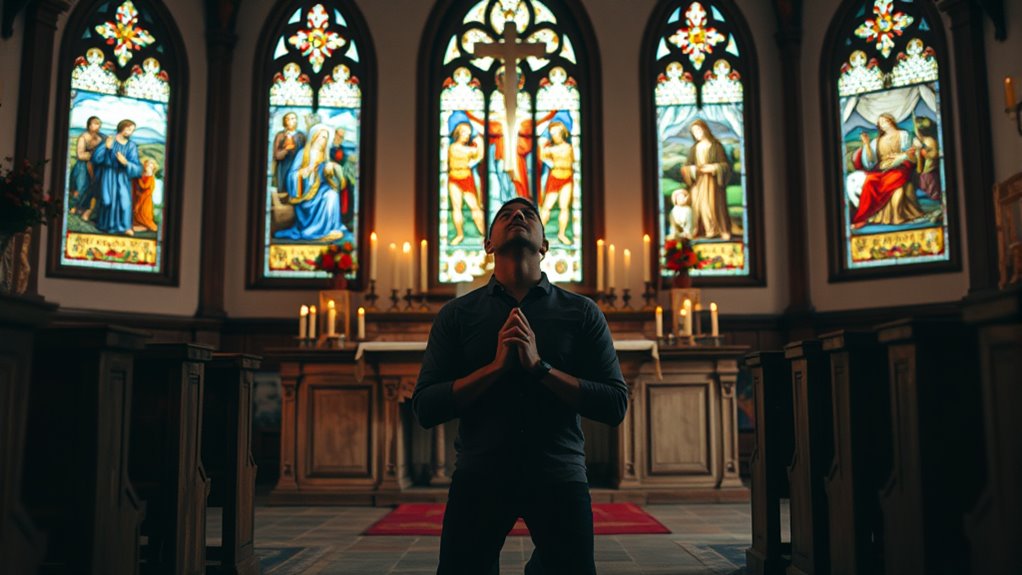
Have you ever wondered if the Bible supports praying for those who have died? While explicit mentions are rare, some scriptures hint at the practice. In ancient funeral customs, praying for the dead was a way to seek spiritual healing and peace for their souls. For example, 2 Maccabees 12:44-46 shows Judas Maccabeus offering prayers and sacrifices for fallen soldiers, reflecting a belief in spiritual intercession. Although this book isn’t part of the Protestant canon, it influences Christian traditions. The idea is that prayer can benefit the departed’s soul, aligning with the biblical theme of spiritual healing. These practices suggest that praying for the dead has roots in biblical thought, even if not directly commanded. Additionally, understanding spiritual intercession helps clarify how prayer might extend beyond the living to those who have passed away.
Historical Practices of Prayer for the Dead in Christianity

Throughout Christian history, praying for the dead has been a widespread and deeply rooted practice, reflecting a belief in the ongoing spiritual connection between the living and the departed. Early Christians often made sacrificial offerings, such as prayers and alms, to aid souls in purgatory. Relic veneration also played a significant role, as saints’ relics were believed to have powerful spiritual benefits, including interceding for the dead. These practices demonstrated a conviction that prayer could influence the afterlife, helping souls find peace or attain salvation. Over centuries, such customs became formalized in liturgies and rituals, emphasizing the community’s care for the departed. This historical context reveals a longstanding tradition of seeking divine favor for the dead through prayer, offerings, and veneration. Additionally, the development of glamping demonstrates how cultural practices can combine comfort and tradition, much like the enduring customs of prayer for the deceased in Christianity.
Theological Perspectives on the Afterlife and Intercession
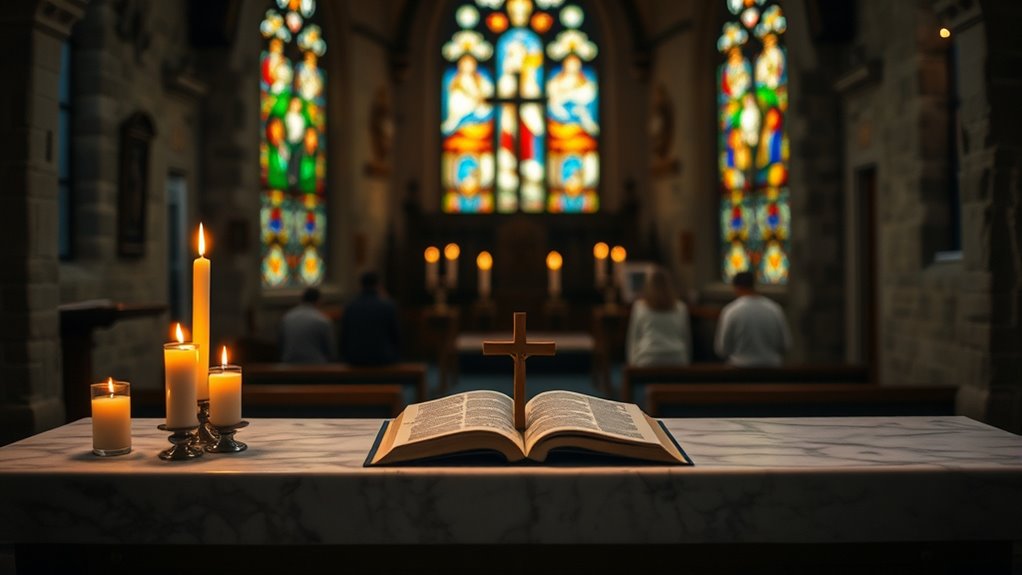
You’ll find that different traditions interpret biblical support for intercession in varied ways, shaping their views on praying for the dead. Catholic and Orthodox churches often see intercession as a essential part of their theology, while many Protestants debate its biblical basis. Exploring these perspectives helps clarify how each group understands the afterlife and the role of prayer beyond this life. Additionally, the concept of intercession in biblical texts influences how believers approach prayer for the departed.
Biblical Support for Intercession
Is there biblical support for the practice of intercession for the dead? While explicit references are scarce, some passages suggest ongoing intercession. For example, consider these points:
- Angelic intercession is hinted at through angels acting as messengers and protectors.
- Hebrews 12:1 speaks of a “cloud of witnesses” encouraging us, implying ongoing support.
- Prayers for the dead appear in 2 Maccabees, which, though not universally accepted, shows tradition’s role.
- Divine mercy is emphasized in passages urging believers to pray for others’ forgiveness and salvation.
- The concept of intercessory prayer is supported by biblical themes of believers praying on behalf of others and trusting in divine mercy.
While these don’t directly command praying for the dead, they highlight the biblical call for believers to intercede, trusting in divine mercy and the spiritual assistance of angelic beings.
Catholic and Orthodox Views
Catholic and Orthodox traditions both hold that the afterlife involves a continued existence beyond death and emphasize the importance of intercession in aiding souls on their journey. They see prayer for the dead as having sacramental significance, connecting the living with the spiritual domain in a meaningful way. These traditions believe that intercessory prayer can provide spiritual healing, helping souls passage and find peace. They view the Eucharist and other sacraments as essential tools that strengthen the bond between the living and the dead, offering ongoing support. This perspective underscores the belief that prayers and sacramental acts can positively influence the spiritual state of the departed, reflecting a deep trust in the power of divine grace to assist souls after death. Additionally, understanding retirement planning strategies can be a way to prepare for the future and support loved ones in their spiritual and material needs.
Protestant Perspectives and Debates
Protestant perspectives on the afterlife and intercession often differ markedly from Catholic and Orthodox views, emphasizing personal faith and direct relationship with God. Many Protestants reject the idea of praying for the dead, focusing instead on Christ’s role as the sole mediator. They believe heavenly intercession occurs through Spirit communication, where the Holy Spirit guides believers directly to God without saints or departed loved ones mediating. Key debates include:
- Whether prayer can influence those beyond the grave
- The role of saints in intercession
- The nature of Spirit communication with the living
- The biblical basis for praying for the dead
Protestants tend to see prayer as an act of faith connecting individuals directly with God, rather than through intermediary saints or spirits.
Denominational Views on Praying for the Dead

Different Christian denominations hold varying views on praying for the dead, reflecting their theological beliefs about the afterlife and the efficacy of intercessory prayer. Historically, medieval rituals and pilgrimage traditions emphasized prayers for souls in purgatory, encouraging believers to seek divine mercy for the departed. Catholicism, for example, advocates prayer and Mass offerings for deceased loved ones, believing in their ongoing spiritual journey. Conversely, many Protestant groups reject these practices, emphasizing direct access to God without intercession for the dead. Some denominations see prayer for the dead as rooted in tradition but not doctrinally necessary, while others consider it essential for spiritual benefit. These differences stem from distinct interpretations of Scripture and doctrine, shaping how each tradition approaches prayers related to the departed. Additionally, understanding the concept of dream symbols can provide insight into how individuals process spiritual questions and beliefs about the afterlife.
The Role of Purgatory and Its Influence on Prayer Traditions
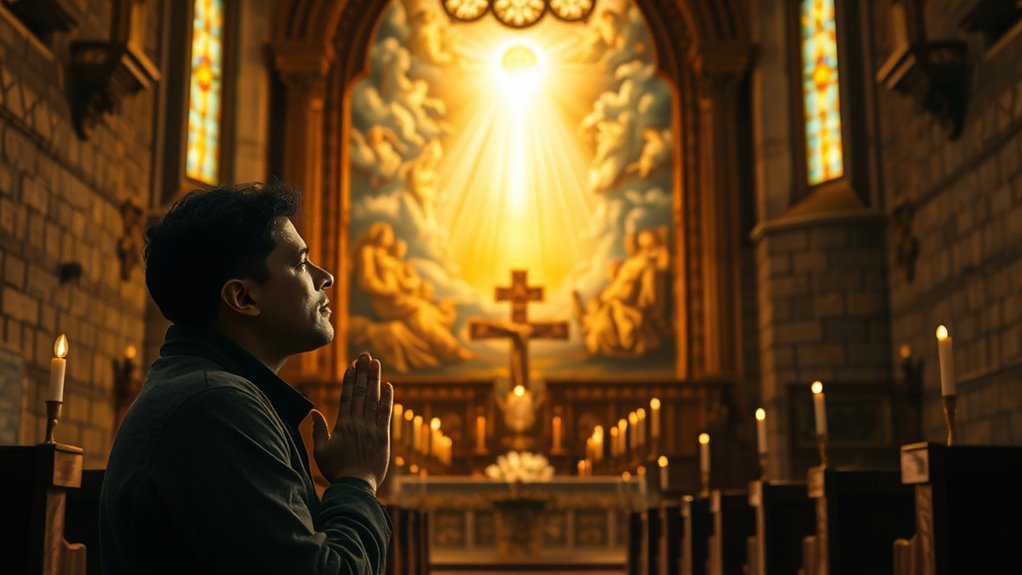
The concept of purgatory has considerably shaped how many believers approach prayer for the departed. Its significance lies in the belief that prayer can help souls in purgatory move toward heaven. This influences prayer traditions by emphasizing ongoing prayers, sacrifices, and masses for the dead. You might notice that:
- Prayers are seen as a means of reducing purification time
- Mass offerings are central to supporting souls
- The efficacy of prayer is linked to compassion and charity
- Purgatory is viewed as a temporary state of purification
- The understanding of exfoliation benefits in skincare highlights the importance of removing impurities, similar to how purgatory is seen as a process of purification for the soul.
These beliefs reinforce the idea that prayer isn’t just for the living but also essential for the spiritual journey of the deceased, making prayer for the dead an act of love rooted in the hope of divine mercy and spiritual progress.
Arguments Supporting Prayer for the Dead
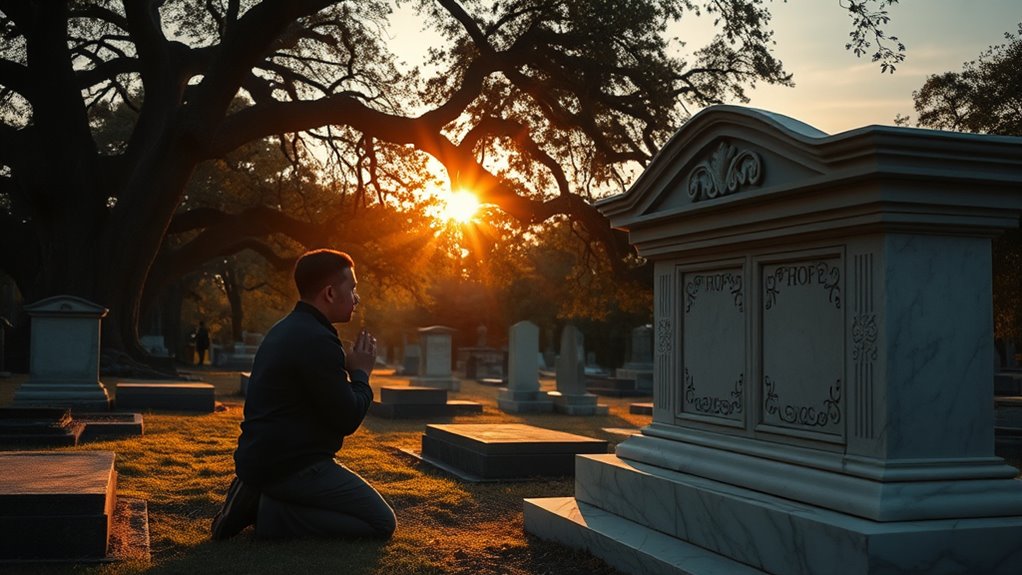
You might consider how prayer has the power to intercede on behalf of the deceased, offering comfort and spiritual aid. Historically, many Christian communities have practiced praying for the dead, showing a long-standing belief in its significance. These traditions suggest that prayers can positively influence the souls of those who have passed away. Additionally, the concept of Halloween as a time to remember the dead underscores the importance some place on spiritual intercession and remembrance.
Intercessory Power of Prayer
Many believers argue that prayer has the power to intercede on behalf of the deceased, offering spiritual aid and comfort that can help purify their souls. They believe that prayer taps into divine mercy, providing a channel for spiritual healing. By praying for the dead, you participate in their journey toward purification and closeness to God. This act of intercession can:
- Invoke divine mercy to soften their spiritual state
- Facilitate spiritual healing and renewal
- Help alleviate their spiritual burdens
- Strengthen the bond of love and hope within the community
- Recognize the importance of personal growth in supporting spiritual progress beyond this life
Supporters see prayer as a compassionate act that recognizes the ongoing spiritual needs of the departed. They trust that such prayers can influence their eternal destiny, emphasizing the profound power of intercession rooted in divine mercy.
Historical Christian Practice
Have early Christians consistently practiced prayer for the dead? Yes. Funeral rituals often included prayers for the departed, reflecting a belief in purification and the possibility of salvation after death. These rituals, like funeral masses, demonstrated a tradition of praying for souls in purgatory. Additionally, saint veneration played a role, as saints were invoked to intercede on behalf of the deceased. Early Christians believed that prayer could assist loved ones in their journey to heaven, and this practice persisted through centuries. Historical records, including writings from the Church Fathers, show that praying for the dead was a common and accepted part of Christian life. The concept of intercessory prayer further reinforced the idea that prayer could positively influence the spiritual state of the departed. This enduring tradition underscores a longstanding Christian belief in the power and importance of prayer for the departed’s spiritual well-being.
Concerns and Criticisms Regarding Praying for the Departed

Critics often raise concerns about the practice of praying for the dead, questioning its theological validity and biblical basis. They argue that prayer efficacy is uncertain once someone has passed, and relying on it might undermine divine justice. Skeptics worry that praying for the departed could imply that human prayers can influence God’s judgment, which conflicts with biblical teachings on divine justice. They also challenge the idea that prayers can help souls in purgatory or beyond, suggesting it may distract believers from their own spiritual growth. Additionally, critics believe that praying for the dead risks fostering superstition rather than genuine faith, and they question whether such practices align with Scripture’s emphasis on God’s ultimate authority and justice.
How Believers Can Approach Prayer for Those Who Have Passed
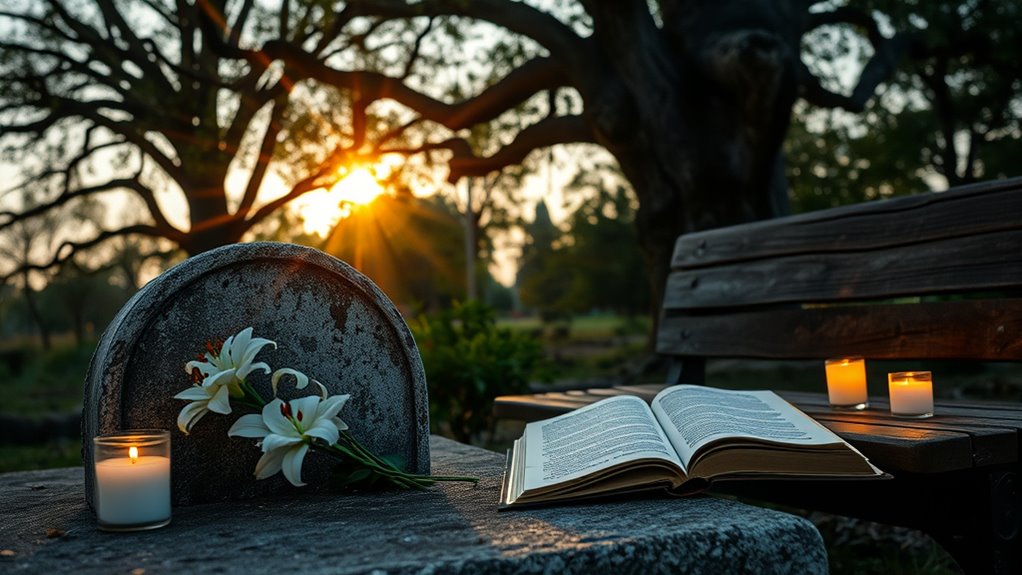
How should believers approach prayer for those who have passed to guarantee their intentions are respectful and biblically grounded? Focus on seeking heavenly intercession, asking God to intervene on behalf of the departed with compassion and humility. Your prayers should emphasize spiritual purification, trusting that God’s mercy can cleanse and restore souls. Avoid directing prayers as if you control the outcome; instead, align your requests with God’s will. Pray for their peace and for God’s justice to be served in accordance with Scripture. Remember, your role is to lift their souls to God, trusting His sovereignty. By praying with reverence and faith, you honor both the departed and God’s divine plan for salvation and mercy.
Frequently Asked Questions
How Do Different Christian Denominations Interpret Biblical References to Praying for the Dead?
Different Christian denominations interpret biblical references to praying for the dead in various ways. Catholics believe in purgatory and see intercessory prayer as helpful for souls in purgatory, supported by tradition and Scripture. Protestants generally reject purgatory and don’t practice intercessory prayer for the dead, citing a focus on personal faith and direct prayer to God. Orthodox Christians also believe in prayer for the dead, emphasizing the ongoing spiritual connection.
What Are the Biblical Verses Most Commonly Cited in Support of Praying for the Departed?
You’ll find biblical support for praying for the departed in scriptural references like 2 Maccabees 12:44-46, where prayer is made for the dead, and 1 Corinthians 15:29, which hints at the hope of resurrection. These verses are often cited by those who believe prayer benefits souls after death. They interpret these passages as showing that praying for the dead aligns with biblical principles and offers spiritual aid.
How Has the Practice of Praying for the Dead Evolved Over Christian History?
Praying for the dead has evolved like a river shaping its course over time. You see, early Christians practiced spiritual communion, asking for heavenly intercession to help souls in purgatory. Over centuries, this devotion deepened, becoming formalized in prayers, masses, and rituals. Today, many traditions still emphasize this practice, viewing it as a loving act that unites the living with the departed in a sacred, ongoing spiritual connection.
What Are the Theological Arguments Against Praying for Those Who Have Died?
You might argue against praying for the dead, believing that divine justice is complete at death, and souls are either in heaven or purgatory. Some say prayer can’t change their state, as it implies uncertainty about divine justice. Others see praying for the dead as a distraction from living faith, emphasizing that only God’s judgment determines a soul’s eternal destiny between purgatory and heaven.
How Can Believers Pray for Loved Ones Who Have Passed Away According to Christian Teachings?
You can pray for loved ones who have passed away by asking for heavenly intercession on their behalf, trusting that saints or angels can advocate for them in God’s presence. You might also create spiritual memorials, like prayers or acts of charity, to honor their memory. These practices help keep their souls in your thoughts and may support their journey, reflecting your love and hope in eternal life.
Conclusion
As you consider whether to pray for the dead, remember that about 60% of Catholics believe in the efficacy of such prayers. While perspectives vary, praying can offer comfort and hope for loved ones’ spiritual journeys. Ultimately, your approach depends on your faith tradition and personal convictions. Whichever path you choose, keep in mind that prayer is a meaningful way to connect with those who’ve passed and trust in God’s grace.

